Have you ever wondered why you feel numb, on edge, or exhausted all the time — but you can’t figure out what’s really wrong? Sometimes, the answer isn’t just “stress.” Sometimes, it’s emotional trauma hiding quietly in your everyday life.
Most people think trauma only means big, dramatic events. But the truth is, emotional trauma in adults can show up in small, sneaky ways: sudden mood swings, trouble trusting others, feeling disconnected from your own feelings, or even constant perfectionism that leaves you drained.
The American Psychological Association (APA) explains that trauma is simply your mind’s response to something deeply upsetting — and when it stays unresolved, it can silently affect your thoughts, your body, and your relationships for years.
If you’ve ever caught yourself wondering, “Is something from my past still hurting me today?” — you’re not alone. This guide will help you spot the real signs of emotional trauma in adults, understand what causes them, and see the hopeful side: you can heal.
Let’s break it down gently, together — so you can stop carrying what you don’t need anymore and start feeling safe in your own mind again.
What is Emotional Trauma?
Emotional trauma is the deep, lasting wound that happens when something overwhelms your sense of safety and shatters your ability to cope. It’s not just about the event itself — it’s about how your mind and body hold on to the fear, pain, or helplessness long after it’s over.
Unlike everyday stress, emotional trauma gets stored in your nervous system and can shape how you react to new situations, even years later. Dr. Bessel van der Kolk, a leading trauma researcher and author of The Body Keeps the Score, explains:
“Trauma is not the story of something that happened back then. It’s the current imprint of that pain, horror, and fear living inside people.”
Emotional trauma can look different for everyone — from sudden shocks like accidents or violence to quieter wounds like growing up with emotional neglect. What matters is not “how big” the event was, but how deeply it shook your sense of trust and safety. Understanding what emotional trauma really is can be the first gentle step toward facing it — and finally giving yourself permission to heal.
Related: What Is Trauma Dumping & Why It Can Be So Toxic
Related: What Are the 17 Symptoms of Complex PTSD?
What Causes Emotional Trauma in Adults?
Emotional trauma in adults can come from so many different experiences — sometimes from something recent, and sometimes from painful memories buried deep in the past. It’s not always about one big dramatic moment; often, it’s the smaller wounds that add up when you’ve felt unsafe or alone for too long.
According to the National Alliance on Mental Illness (NAMI), here are some common causes that can leave lasting emotional scars:
- Childhood experiences:
Physical, emotional, or sexual abuse; neglect; witnessing domestic violence; growing up around addiction or untreated mental illness; losing a parent through divorce or abandonment.
- Adult experiences:
Physical or sexual assault; car accidents or serious injuries; sudden loss of someone you love; witnessing violence or tragic events; natural disasters; combat exposure; workplace bullying or toxic work environments; medical trauma from serious illness or surgery.
- Betrayal Trauma:
Infidelity in relationships; betrayal by trusted individuals; institutional betrayal (such as abuse by teachers, or employers…
- Systemic and Cultural Trauma:
Discrimination; racism; poverty; immigration-related stress; or generational trauma passed down through families.
It’s important to remember that trauma is subjective — what deeply hurts one person might not affect another in the same way. The impact depends on things like personal resilience, support systems, and how safe or unsafe you felt at the time. No matter where it comes from, understanding the root of your trauma is the first step toward gently healing it.
What Are the Symptoms of Emotional Trauma in Adults?
Emotional trauma doesn’t just affect the mind — it can ripple through every part of your life. From physical pain to trust issues in relationships, the symptoms often show up in ways we don’t immediately connect to trauma. To make it easier to recognize, here’s a breakdown of how emotional trauma can impact different areas of your life:
1-Emotional and Psychological Symptoms:
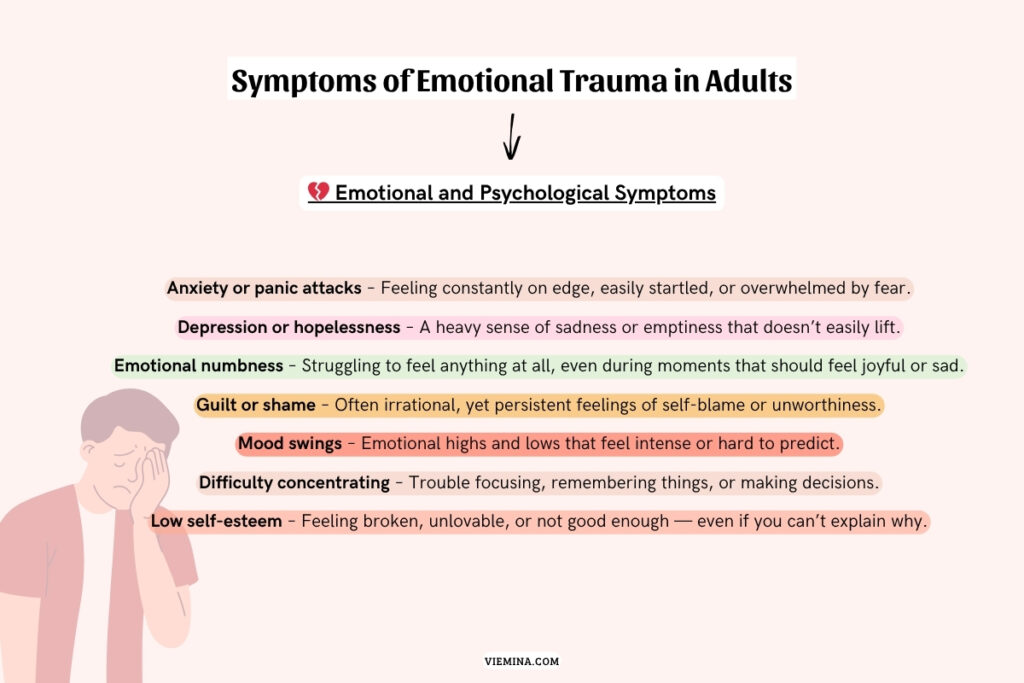
2-Physical Symptoms:
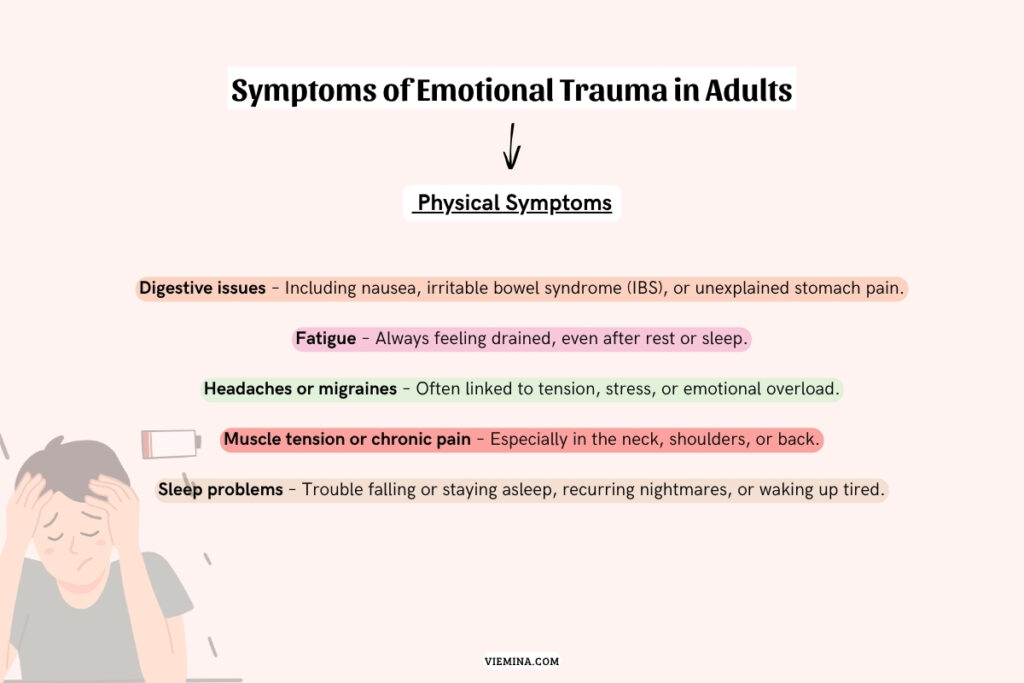
3-Behavioral Symptoms:
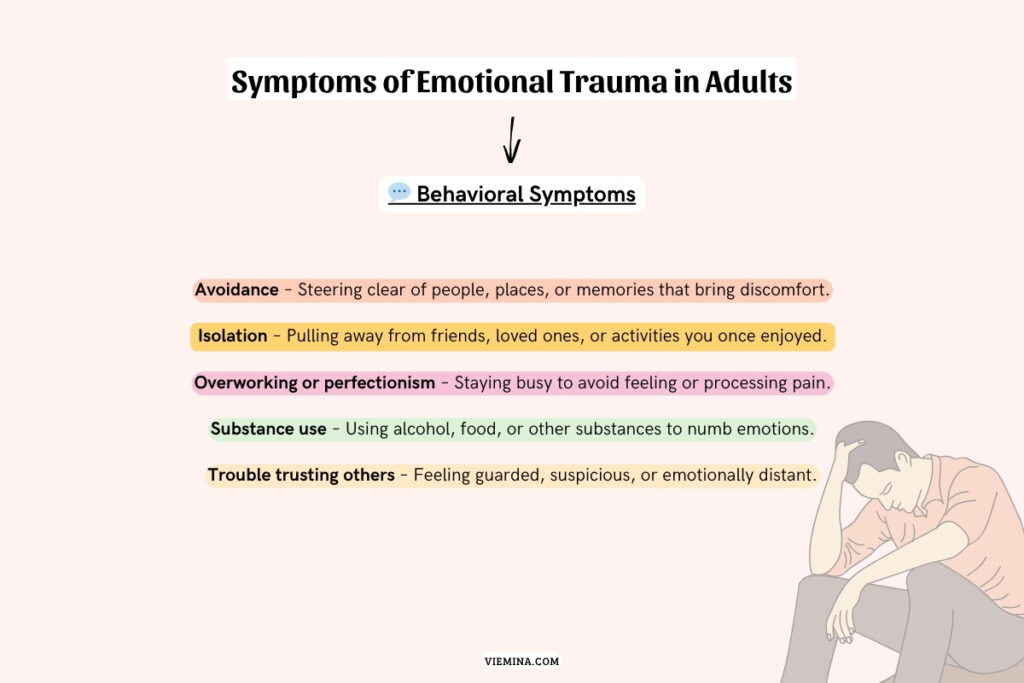
4-Relational Symptoms:
15 Clear Signs of Emotional Trauma in Adults
Emotional trauma doesn’t always show up the way you’d expect. Some signs are loud and clear — others hide quietly in your daily life until you realize they’re still affecting you. If you recognize yourself in any of these, know you’re not alone. Not everyone will have all of these signs, but noticing even a few can be a gentle signal that it’s time to start healing.
Here are some of the most common signs of emotional trauma in adults to look for:
1-Emotional Numbness
Feeling disconnected from your emotions or experiencing a persistent sense of emptiness is a common trauma response. This numbness serves as a protective mechanism, helping the mind cope with overwhelming feelings. Adults with emotional numbness might describe feeling like they’re “going through the motions” or watching their life from the outside. They may struggle to feel joy, sadness, or connection with others, even in situations that would typically evoke strong emotions.
For Example:
You noticed you couldn’t feel excited about your promotion at work or sad when your pet passed away. we can describe this feeling like “wrapped in cotton,” unable to access your emotions fully.
2-Flashbacks or Intrusive Memories
Sudden, vivid memories of traumatic events that feel as if they’re happening in the present moment are hallmark signs of trauma. These flashbacks can be triggered by sights, sounds, smells, or situations that remind the brain of the original trauma. Unlike regular memories, flashbacks are accompanied by the same physical and emotional responses experienced during the original event.
Real Example:
Sara experiences vivid flashbacks of a car accident. Now every time she hears tires screeching, boom – she’s right back in that moment. And that caused her to feel the same panic and physical sensations she felt during the crash. Heart racing, palms sweating, the whole nine yards. Her body’s basically having a full meltdown over something that happened ages ago.
Look, if you’re dealing with this stuff, it doesn’t mean you’re weak or whatever. Your brain’s just doing this annoying thing where it thinks it’s keeping you safe, but really it’s just making the normal things a nightmare.
Related: 24 Powerful Techniques For Letting Go Of The Past
3-Low Self-Esteem or Self-Blame:
One of the sneakiest signs of emotional trauma in adults is how it totally messes with your self-image. Like, trauma doesn’t just mess you up in the moment – it moves in and starts whispering all this toxic stuff about how everything was somehow your fault.
Your brain does this really unfair thing where it tries to make sense of what happened by putting the blame on you. “If only I’d been smarter, stronger, said something different…” Sound familiar? It’s like your mind would rather believe you had control (even if that means blaming yourself) than accept that bad things just happen sometimes.
And here’s the kicker – this self-blame doesn’t just disappear when the trauma’s over. It sets up camp in your head and starts commenting on everything. Got a promotion? “It’s just luck.” Someone compliments you? “They don’t really know me.” It’s exhausting.
For Example:
*Take Anna – she’s killing it at work, but she can’t see it.* Every success gets brushed off as a fluke because trauma often creates this warped filter where you can’t recognize your own worth. Her childhood emotional abuse taught her that she wasn’t good enough, and now that voice follows her everywhere.
The really messed up part? This isn’t just about feeling bad about yourself. When you’re constantly doubting your abilities and second-guessing every decision, it affects everything – your career, your relationships, even simple daily choices become this huge internal debate.
But here's what's important to remember: that voice isn't telling you the truth. It's just trauma talking.
Related: Low Self Esteem: 10 Effective Ways to Improve Self-Worth
4-Hypervigilance:
You know how some people can just chill at a coffee shop and actually enjoy their latte? Well, if you’re dealing with trauma, your brain might have other plans. It’s like having this overly paranoid security guard living in your head who’s convinced danger is lurking around every corner.
This is one of those signs of emotional trauma in adults that people don’t always recognize right away. You’re not just being “careful” – you’re literally exhausting yourself by constantly scanning for threats that probably aren’t even there. Your nervous system is stuck in “code red” mode, even when you’re supposed to be relaxing.
It’s wild how this shows up in everyday life. Maybe you can’t focus during meetings because you’re too busy listening for weird sounds. Or you get jumpy when someone walks up behind you. Some folks need to scope out every exit before they can even think about sitting down anywhere.
The thing about hypervigilance is that it made sense at some point – your brain learned to be on high alert because it had to be. But now it’s like having a car alarm that goes off every time a leaf falls. Your body’s trying to protect you, but it’s also stealing your peace of mind in the process.
Related: Causes and Examples of Hypervigilance
5-Avoidance Behaviors:
Deliberately avoiding people, places, activities, or conversations that might trigger memories or feelings related to the trauma is a common coping strategy. While avoidance can provide temporary relief, it often limits life experiences and can prevent healing from occurring naturally.
6-Substance Abuse:
Many adults turn to alcohol, drugs, or risky behaviors like overspending, gambling, hookups, or even overworking as a way to numb emotional pain or cope with trauma symptoms. These actions give the brain a temporary break from the overwhelming mental and emotional stress. While they might offer short-term relief, they often lead to more serious issues—like addiction, financial trouble, or emotional burnout—and can actually get in the way of real healing and long-term recovery.
Look, When you’re dealing with trauma and your head feels like it’s on fire 24/7, the idea of just… turning it off for a while sounds pretty amazing. A few drinks and suddenly you’re not replaying that awful thing that happened. Pop a pill and boom – the anxiety chills out. It’s like having a remote control for your feelings.
The problem is, it’s kind of like putting a Band-Aid on a broken bone. Sure, you can’t see the injury anymore, but it’s still there, and now you’ve got this whole other mess to deal with.
Related: How to Break Bad Habits and Stop Your Addiction ? ’15 tips’
7-Unexplained Physical Symptoms:
Sometimes, trauma doesn’t come out in tears—it shows up in your body instead. You might start getting weird symptoms that doctors can’t fully explain, like constant headaches, stomach problems, tight muscles, feeling exhausted all the time, or even autoimmune flare-ups.Research shows a strong connection between trauma and physical health, especially since trauma impacts the nervous system and throws off your body’s stress hormones. In other words, your body remembers—even when your mind tries to move on.
8-Difficulty Sleeping or Nightmares:
Sleep disturbances are extremely common in trauma survivors. This can include difficulty falling asleep, staying asleep, or experiencing vivid nightmares related to the trauma. The brain’s hypervigilant state makes it difficult to achieve the relaxation necessary for restorative sleep.
Related: Sleep Deprivation: Symptoms, Causes, & 10 Effects
Related: Insomnia :Symptoms ,Causes & 10 Types
9-Isolation or Withdrawing from Relationships:
You know how sometimes you just need to be alone to recharge? Well, one of the sneakiest signs of emotional trauma in adults is when that “alone time” becomes basically your whole life. You’re not just taking a break from people – you’re actively building walls to keep them out.
It starts small, usually. You cancel plans here and there because you’re “not feeling up to it.” Then you stop making plans altogether. Before you know it, your phone’s been on silent for days and you’re genuinely surprised when someone texts asking if you’re alive.
The thing is, it’s not that you suddenly hate people. It’s more like… explaining how you’re feeling sounds exhausting. How do you tell your friends that you can’t handle loud restaurants anymore? Or that small talk feels like you’re speaking a foreign language? Sometimes it just feels easier to disappear than to keep pretending you’re okay.
Related: living alone
Related: 7 Stages of Trauma Bonding: Effects, Causes & How to Heal
10-Feeling Overwhelmed by Everyday Tasks:
Trauma can affect executive functioning, making normal daily tasks feel insurmountable. Simple decisions or routine activities may trigger feelings of panic or paralysis. This isn’t laziness or lack of motivation – it’s a genuine neurological response to trauma.
For Example:
Simple tasks like grocery shopping or paying bills can feel totally overwhelming. Many people describe it as “drowning” in everyday responsibilities—things that once felt easy now seem impossible to manage.
Related: 8 Japanese Techniques To Overcome Laziness
11-Difficulty Trusting Others:
Trust issues might sound like some cheesy relationship drama, but it’s actually one of the most brutal signs of emotional trauma. Your brain basically becomes this overprotective bouncer that’s like “nope, nobody gets in without a full background check and three references.”
The thing about trust is that once it gets shattered, it doesn’t just affect romantic stuff. Suddenly you’re second-guessing your best friend’s text tone, wondering if your coworker’s being fake nice, or convinced your family’s just waiting for the right moment to let you down. It’s like wearing this invisible armor that keeps everyone at arm’s length.
Related:16 Signs of an Introvert + Types, Myths & Famous Lessons
12-Perfectionism or Overworking to Numb Pain:
For some people, trauma doesn’t show up as tears or anxiety—it shows up as never slowing down. You throw yourself into work, obsess over getting everything just right, and push yourself to be “perfect” all the time. From the outside, it looks impressive—you’re a high achiever, super productive, always in control. But beneath the surface, it’s often a way to avoid sitting with painful emotions. Perfectionism and overworking can feel like a safe space, a way to stay in charge when everything else feels messy. But constantly staying busy doesn’t leave much room to actually feel… or heal.
Related: How To Overcome Perfectionism in 10 Tips
Related: Embracing Imperfection: 9 Top Steps to Self-Acceptance
13-Changes in Appetite and Trouble Concentrating:
Trauma doesn’t just mess with your emotions—it can also throw off your basic daily functions. Some people lose their appetite completely, while others eat more than usual in an effort to self-soothe. Neither one is “wrong”—it’s just your body reacting to stress.
At the same time, focusing can feel like a struggle. You might read the same sentence five times, forget what you were doing, or space out during conversations. It’s not about being lazy or distracted—it’s your brain working overtime just to process what you’ve been through.
Related: 10 Ways to Stop Emotional Eating And Be Mindful Of Your Diet
14-Feelings of Hopelessness or depression (When Your Brain Convinces You This Is Forever):
One of the heaviest signs of emotional trauma in adults is when that dark cloud just… doesn’t lift. We’re not talking about having a bad day or feeling bummed about something specific. This is more like your brain got stuck on this channel where everything feels pointless and nothing’s ever gonna get better.
It’s weird how trauma messes with your ability to imagine a future that doesn’t suck. Like, you know logically that time moves forward and things change, but emotionally?
It feels like you’re stuck in this gray bubble—where good things just don’t seem to happen to people like you anymore.
What makes this different from regular sadness is how long it lingers and sticks. Normal sadness usually has a rhythm—you cry, you process it, and eventually, you start to feel better and move on.
But trauma in adults creates this persistent heaviness that colors everything. Your favorite song sounds flat. Hanging out with friends feels like you’re just going through the motions. Even good news bounces right off you because your brain’s like “yeah, but what’s the point?”
The thing about trauma-related depression is—it’s not just about feeling sad. It’s more like your brain’s GPS is broken, and it can’t find the way back to “normal.” You start to feel lost, emotionally disconnected, and eventually, you begin to believe that happiness just isn’t meant for you anymore. It’s not that you don’t want to feel better—it’s that you honestly can’t remember what “better” even feels like.
Related: Smiling Depression: The Hidden Pain Behind a Happy Face
Related: Understanding The 8 Different Types of Depression
15-Suicidal Thoughts After Trauma:
In more severe cases, trauma can become so overwhelming that it leads to thoughts of self-harm or suicide. These aren’t attention-seeking or dramatic—they’re a reflection of just how deep the emotional pain really runs. It can feel like there’s no way out, like the only way to stop the hurt is to stop everything.
For some, when the trauma symptoms pile up—constant anxiety, flashbacks, numbness, exhaustion—it can feel impossible to keep going. These thoughts need to be taken seriously. They’re a signal that help is urgently needed, and there is help out there. Reaching out, whether to a loved one or a mental health professional, can truly make all the difference. You don’t have to go through it alone.
Crisis Resources: If you or someone you know is having suicidal thoughts, contact the 988 Suicide & Crisis Lifeline immediately by calling or texting 988, or visit their website at 988lifeline.org.
But here's what's important - those thoughts are lying to you. They're not telling you the truth about your future or your worth. They're just trauma trying to convince you that this moment is forever, when it's not.
The pain you're feeling is real, but so is the possibility that things can get better. You just might need some help getting there.
How to Heal from Emotional Trauma?
Here’s the thing—healing from emotional trauma isn’t a straight line. Some days you’ll feel okay, maybe even hopeful. Other days? You’re curled up under a blanket wondering if you’re ever going to feel like yourself again. It’s frustrating, slow, and honestly? It takes way more patience than anyone tells you. But that doesn’t mean it’s impossible. Because it is possible. And you don’t have to do it all on your own.
Here’s what can help:
1-Professional Help:
Therapy isn’t a magic fix—but wow, it can make a huge difference when you find the right person. Especially someone who understands trauma. Not every therapist is trained in it, so working with someone who knows how trauma works? That’s a game-changer.
Evidence-based therapies have shown remarkable success in helping trauma survivors:
- Cognitive Behavioral Therapy (CBT):
Helps identify and change negative thought patterns and behaviors related to trauma.
- Eye Movement Desensitization and Reprocessing (EMDR):
A specialized therapy that helps process traumatic memories by using bilateral stimulation.
- Somatic therapy:
Because trauma doesn’t just live in your head. Your body holds it too.
- Trauma-Focused Therapy:
Specifically designed approaches that address the unique needs of trauma survivors.
2-Little Things That Actually Support Healing:
Besides therapy, there are small things you can do that make a difference over time:
- Meditation or mindfulness : Simple daily practices can calm your nervous system and ease emotional overwhelm.
- Journaling, even if it’s messy. You don’t need to be a writer. Just get the feelings out.
- Movement—walks, yoga, stretching. Anything to get your body feeling safe again.
- Support groups, online or in person.Connecting with others who have similar experiences can reduce isolation and provide practical coping strategies.
- Grounding Techniques: Practices like deep breathing, progressive muscle relaxation, or the 5-4-3-2-1 technique can help manage acute symptoms.
Related: 9 Types of Self Care Everyone Needs to Practice
3-Learning to Trust Again:
This might honestly be one of the toughest parts of healing—learning to trust people again. After trauma, trust can feel like walking into a trap. You want connection, but your guard’s always up. And that makes total sense. Still, healing often happens in safe, healthy relationships. Little by little, it gets easier.
- Start small—no need to rush. Let trust build over time.
- Be honest about what you need and where your boundaries are.
- Surround yourself with people who actually get and respect your healing process.
- And when setbacks happen (because they will), try to be kind to yourself. You’re doing the best you can—and that matters.
You’re Not Broken—You’re Healing
If you’re in the thick of it, I know it doesn’t feel like things will ever get better. But they can. It takes time. It takes support. And it takes giving yourself permission to heal at your own pace.
Conclusion:
Learning to recognize the signs of emotional trauma in adults isn’t about checking boxes — it’s about finally making sense of what you’ve been feeling. Things like shutting down emotionally, snapping over small stuff, or always being on edge aren’t personality flaws. They’re signs that something deeper is going on.
And if any of this hits close to home, let me say this: you’re not broken — you’re human. Trauma has a quiet way of shaping how we see ourselves and the world. But that doesn’t mean you’re stuck. With the right support — whether it’s therapy, a trusted friend, or just learning to be gentler with yourself — healing is possible.
Even reading this article is a powerful first step. So don’t stop here. Talk to someone you trust, reach out for professional help, or share this with someone who might need it too.
✨ You’re not alone in this — and you don’t have to figure everything out today. Just keep going. Your story isn’t over.
Related: 23 Signs of Repressed Childhood Trauma in Adults
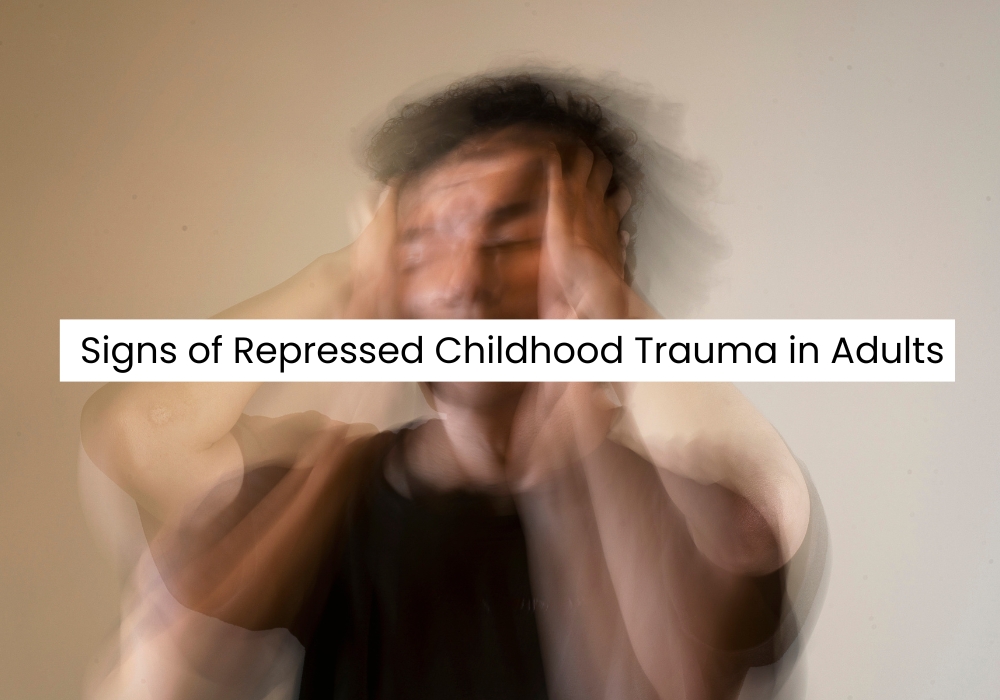
Frequently Asked Questions
-
Can emotional trauma go away on its own?
In some cases, mild emotional trauma may ease over time. But deeper wounds—especially those rooted in childhood or repeated experiences—often need support and guidance to fully heal.
-
How long does it take to heal from trauma?
Honestly? It depends. There’s no magic number. For some, it’s months; for others, it’s years. The timeline depends on the severity of the trauma, how long it lasted, and whether you have support systems in place.
It’s not about how fast you heal—it’s about moving forward at your own pace. -
What’s the difference between trauma and PTSD?
Trauma is the emotional response to a distressing event. PTSD (Post-Traumatic Stress Disorder) is a clinical diagnosis when severe symptoms—like flashbacks, extreme avoidance, and heightened alertness—persist for over a month and significantly disrupt daily life.. Not everyone with trauma has PTSD, but the two are closely connected.
-
How can I help someone who might be dealing with trauma?
Start by being present. You don’t need all the answers—just be someone who listens without judgment. Let them set the pace, respect their space, and if they’re open to it, gently suggest they talk to a pro. Sometimes just knowing someone cares is huge.

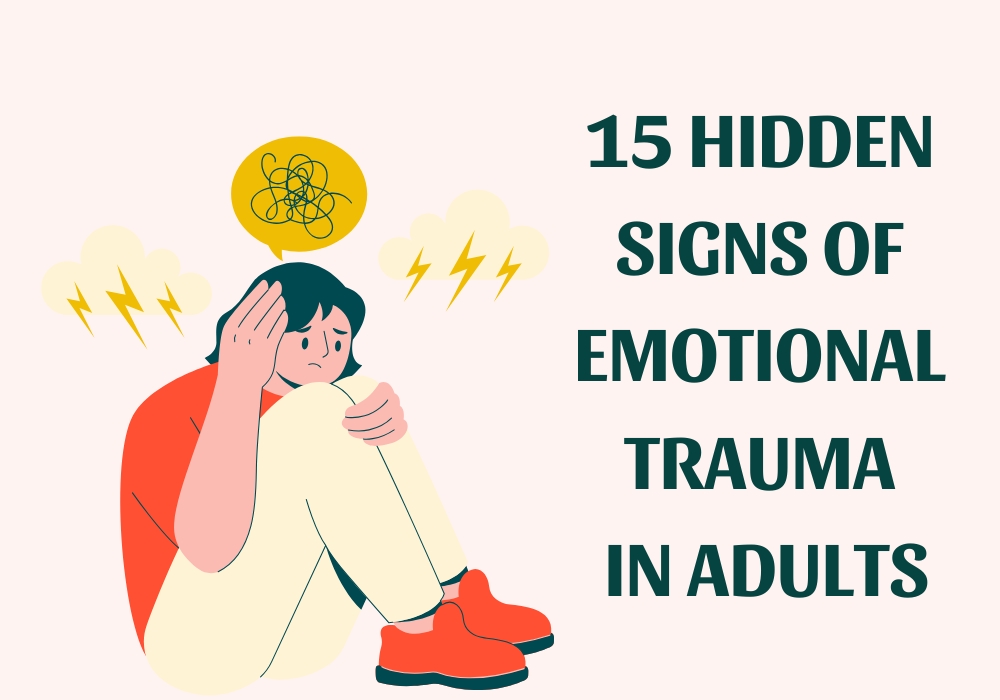
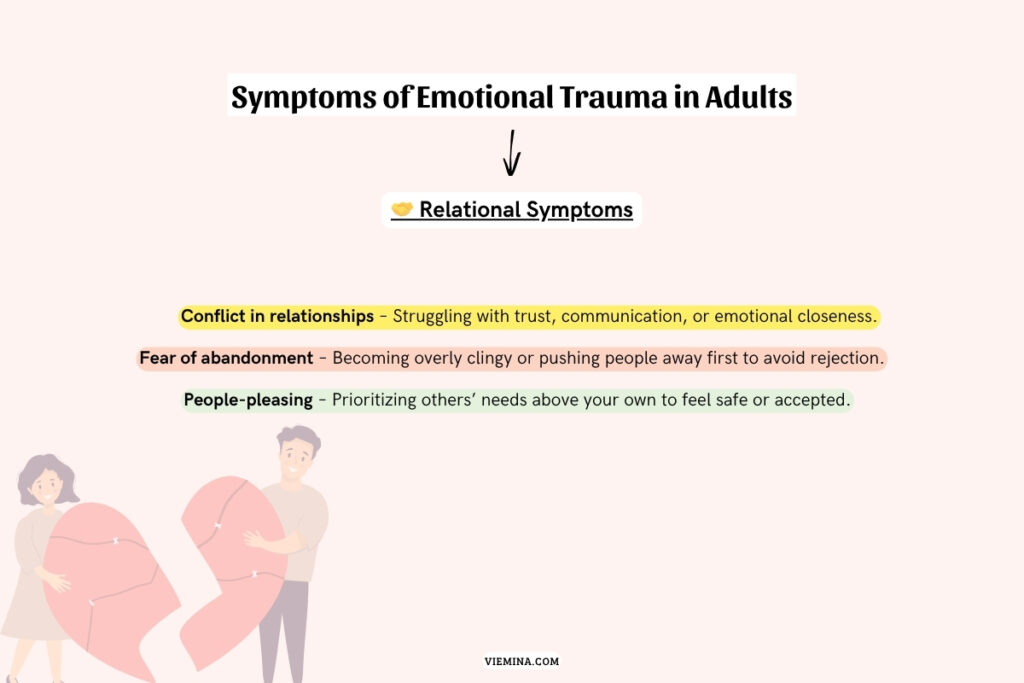
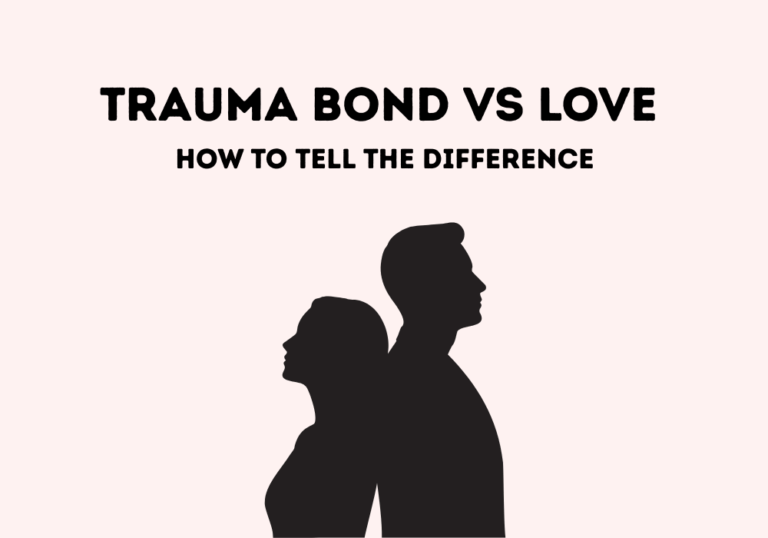
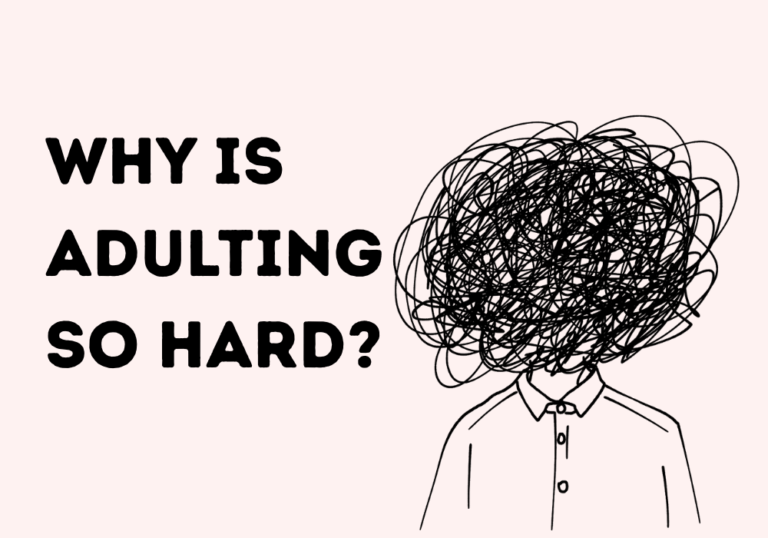
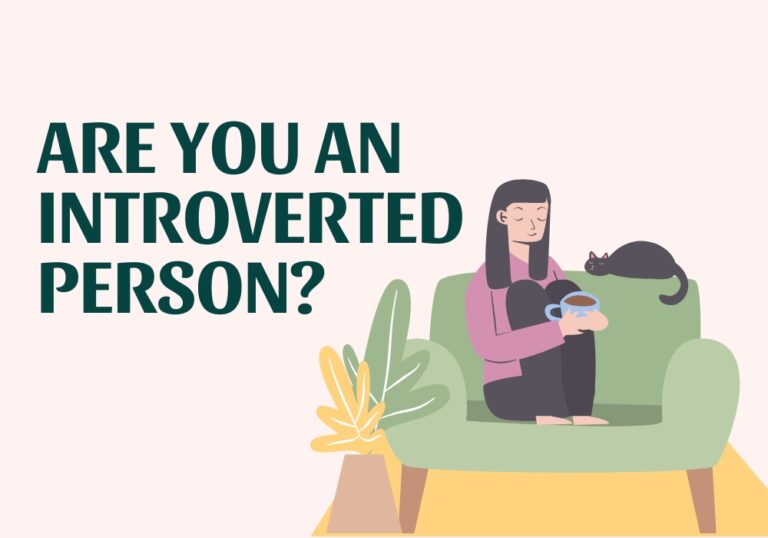




This article is a real gem for anyone feeling a bit numb or like their bodys throwing a tantrum they cant win. Who knew feeling overwhelmed by grocery shopping could be a trauma sign? Honestly, the section on self-blame had me in stitches, especially the fluke example – so relatable! And the hypervigilant coffee shop guy? Brilliant! Its funny how our brains go full-on high alert over a leaf falling, but seriously, its a great reminder that those quirky coping mechanisms (like avoidance or overworking) might be more trauma talking than anything else. Definitely made me chuckle, but also, you know, kinda helpful?
So happy it made you laugh, and even happier to know it was helpful! 💛
Thank you so much for this beautiful comment! 💛😍